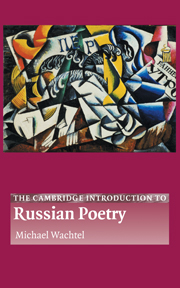Introduction
Published online by Cambridge University Press: 05 June 2012
Summary
Поэ́т – издалека́ заво́дит ре́чь.
Поэ́та – далеко́ заво́дит ре́чь.
Цветаева, «Поэ́ты»The poet brings language from afar.
Language brings the poet far.
Tsvetaeva, “Poets”When poets read their works aloud, we may not understand every word, but we immediately recognize that their intonation differs from that of everyday speech. This “unnatural” declamation often causes confusion among those who first encounter it. “Why don't they just read it normally?” one is tempted to ask. The reason is simple: poets want to set their speech off from everyday language. Individual poets vary widely in the degree of “unnaturalness” they introduce to their readings, but in virtually all cases their goal is the same: to destabilize the familiar world of their listeners, to make them hear anew.
All of us, poets or not, alter our tone of voice and choice of words in accordance with specific circumstances. We speak differently with our parents than with our peers, we address the auto mechanic differently than the policeman, we speak differently when giving a toast than we do when calling for an ambulance. In many life situations, what might be called the prosaic attitude toward language dominates. Our object is to relay information as quickly and unambiguously as possible. At other times, getting the point across is not enough; it is essential to do so convincingly and fervently. We select our words carefully and consciously organize them.
- Type
- Chapter
- Information
- The Cambridge Introduction to Russian Poetry , pp. 1 - 12Publisher: Cambridge University PressPrint publication year: 2004

